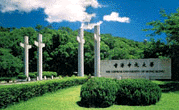

| |
|
|


|
The Chinese University of Hong Kong (CUHK) was established in 1963. Thirty-two years later, its wider goals are much the same as they were then: to preserve and enrich Chinese culture, to explore and extend modern Western knowledge, and to integrate the cultures of the East and the West. It remains a comprehensive and bilingual university, using both Chinese and English as the medium of instruction. The University continues to expand, and today there are four colleges and seven faculties with approximately 1,000 academic staff. On 31 December 1996, the student enrolment figure stood at 12,846, of whom 80% were undergraduates and 20% postgraduates. The annual budget of the CUHK is about HK$2.8 billion (US$360 million), one of the largest in Hong Kong. The University derives the bulk of its funding from the Government through the University Grants Committee (UGC) and from tuition fees. The CUHK campus, despite the steady expansion, remains spacious and scenic. Situated on 134
hectares of mountainous terrain in the New Territories, it has panoramic views across Tolo Harbour of mountains and sea stretching out towards China.
|

|
Research at the CUHK |
|
The CUHK fosters quality research over a broad front in its seven faculties: namely, Arts, Business Administration, Education, Engineering, Medicine, Science, and Social Science. It offers opportunities for significant advances in human knowledge, and provides scope for academic staff to undertake consultancy and collaborative projects with industry. While encouraging both basic and applied research in all academic areas, the University also realizes that to achieve excellence and world-wide impact, it is necessary to focus on and devote preferential resources to certain specific areas of academic importance. These areas include mathematical sciences, telecommunication network research, cancer research and treatment, Chinese medicinal materials research, the study of the reform and development of China and the region, the study of Hong Kong as a business gateway to China, and the study of comparative culture and humanistic education. These areas offer unique research opportunities and are world-class strengths within the University. | |

| |